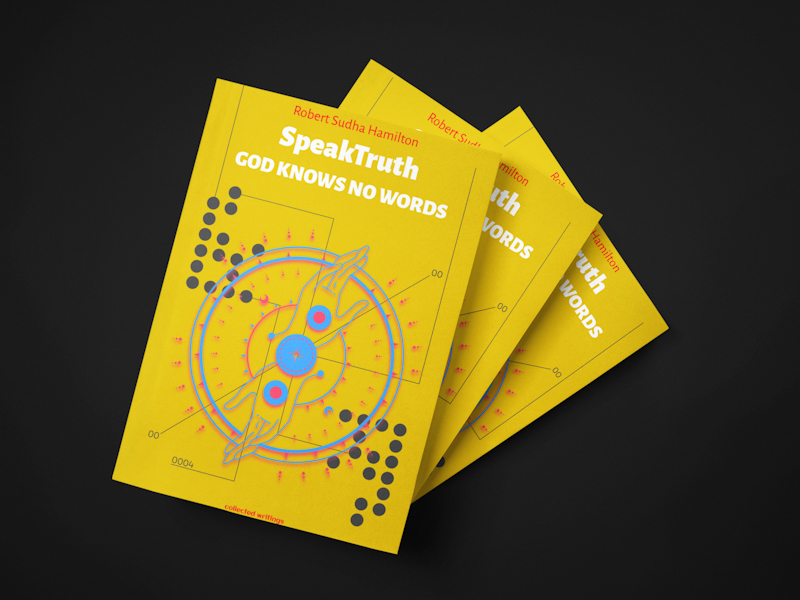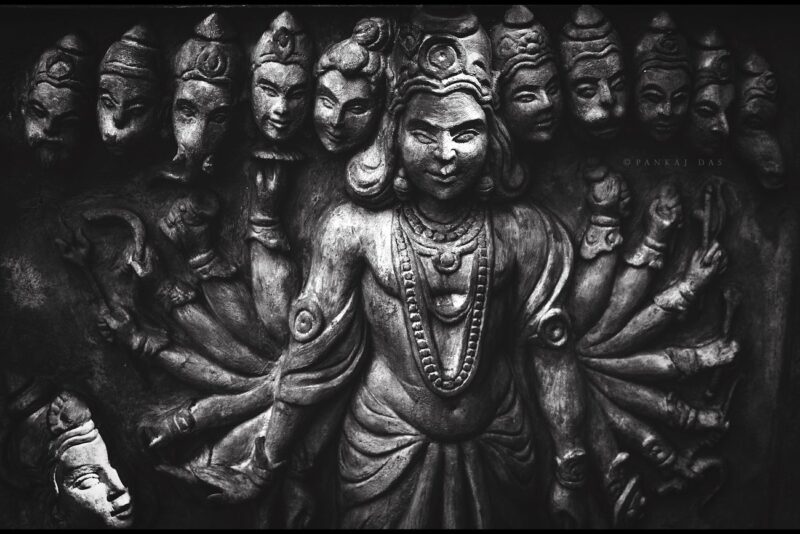
Do you ever long for certainty? Do you wish that you had a direct line to God, especially during those times when you are really unsure about what direction to take in your life? Would you like to be able to reach deep inside yourself and just know the right answer? Well according to the theory of the bicameral mind, and its part in the origin of consciousness, we all do have that facility within our brains. In fact it was originally all we did have, as it preceded that sense of I or me, our very own subjective consciousness which we all have today. Julian Jaynes published his book, The Origin of Consciousness in the Breakdown of the Bicameral Mind, in 1976 and the waves of influence have been spreading out ever since. The first sixty pages of his book are to me, the most immediately confronting and mind expanding – as they focus on what consciousness actually is or is not.
Consciousness What Is It?
by Robert Hamilton

I mean consciousness is not mere reactivity or being awake, it is much more than that isn’t it? Think about what your sense of consciousness is to you. Where is your consciousness located? Is it somewhere on or in your body? What purpose does your consciousness serve? Is it so that you can learn things? Jaynes lists a number of scientific studies showing that our ability to learn things is not dependent upon our sense of consciousness and is actually impeded by it – a perfect example is when we are overly self-conscious we cannot perform basic tasks that involve motor skills like talking. Try it now, try speaking and at the same time focus on your articulation, bringing your full consciousness to bear on every enunciated syllable. How each vibrational sound is made inside your throat – you will just stop speaking as it becomes overwhelming.
Our consciousness is also not a perfect copy of our experiences; it is not some recording device taking impressions of memories and storing them. You can show this to yourself by asking yourself what information you can remember about walking into the last room you walked into. Try remembering what was in the room and where, get a piece of paper and write down your results. You will find that you have very little to show for it, so our consciousnesses are not providing this service. Jaynes goes on to say, that when we recall a memory, we do not call up the actual physical memory but a generalised version of it largely invented by ourselves to represent whatever it is – swimming or walking in a park. The memory is a construct involving thoughts we have about the activities and often is influenced by how we imagine others see us swimming or walking – so our consciousness is not a faithful recording of reality.

What Julian Jaynes does posit, is where our sense of consciousness has come about from, and he points the finger at language and in particular languages love of metaphor. In fact he states language is largely metaphor and shows how many words have their roots in metaphor, for example the verb ‘to be’ comes from the Sanskrit ‘bhu’- meaning to grow, or make grow. Similarly our English words ‘am’ and ‘is’ have evolved from the Sanskrit ‘asmi’- meaning to breathe. Think to yourself now just how many times our language references other familiar pictures to describe less familiar things. For example how we use parts of the human body to describe parts of other things, like the face of a clock, cliff, card; and the eyes of needles, storms, potatoes; the lips of cups, craters; and the tongues of shoes, joints; and the teeth of winds, cogs etc. Indeed we reference and compare constantly with language, in the meaning of the words themselves and in the expressions we invent to make metaphors with. The vastness of language over several millennia means that we lose touch with its incredible elasticity and tend to think of it as some solid construct, missing the obvious evidence it has to show us about ourselves and the origin of consciousness.
It is through the ability to metaphor that the modern lexicon of our language is able to remain a reasonably finite collection of words. Otherwise like the Inuit we would have to have 150 different words for snow. Jaynes talks about the function of metaphor being one of creating understanding through familiarity. We use a familiar example to shine a light on something less familiar, but ultimately this brings us a limited understanding based entirely on the quality of the metaphor employed. I would go on to say that it means we actually know far less than we think we do. An example of this would be our understanding of what happens during an electrical storm, we have learnt at school that it involves air pressure, vacuums and particle friction but we have no real direct experience of what happens and only a theoretical knowledge of it. Our sense of subjective consciousness is based on how we perceive existence through the use of language and referencing through metaphor. It is like the relationship between a map and the geographical reality of what has been mapped. So ultimately our knowledge of reality is a tenuous one at best and it is riddled with theoretical understandings based on metaphorical language constructs. You think you know stuff that you don’t really.

Where does that certainty principle, I mentioned at the beginning, fit into this? It seems like we are getting further and further away from that shore of assurance. Well Jaynes postulates, that prior to the development of our illusory sense of subjective consciousness, we had a fully operating God spot in the right hemisphere of our temporal lobe and it was here that we received direct transmission from the divine. He lists a number of studies into the brain, where scientists have removed sections and whole hemispheres to reveal what areas of the brain are responsible for particular functions and how the brain adapts. He gives a fascinating example where a dozen neurosurgical patients have undergone a complete commissurotomy, the cutting of all interconnections between the two hemispheres down the middle, as a treatment for severe epilepsy. For a period of about two months some patients lose the power of speech, but gradually they all return to a sense of being how they were prior to the operation. Normal observation of these patients shows nothing amiss either. However under rigorous study it becomes clear that these people cannot see things on their left side and the dominant left hemisphere projects a repeat of the right side vision to fill in the gaps. Even more astonishing though is that the right hemisphere is actually seeing what is there on the left side but because of the cutting of the interconnections between the two sides of the brain has no way to communicate it. Tests have shown that these people using their left hand only can point out or draw what is on the left side but have no verbal or cognitive awareness of what is there. It is like there are two separate awareness’s, functioning independently within the same body.
Julian Jaynes goes on, in a satisfyingly erudite manner, to illustrate through countless examples taken from the great recorded histories like The Iliad, The Old Testament, Egyptian Papyruses, Babylonian Cuneiforms and more, how different humankind was at this time. That this difference in how they thought was because of this bicameral mind, that there were literally two separate minds at work within them. A dominant over mind or ‘God speak’ operating from the right hemisphere, which was triggered during times of stress or novel challenges outside the normal demands of the time, and the more prosaic left hemisphere ‘man brain’, which at this time had no subjective consciousness, no sense of I or me. Jaynes takes you on a journey from languages evolution from signalling and intentional calls to the development of nouns. Remember for a long time nobody had a name for things and for individuals. Death was a different beast when the one who died did not even have a name. Try and imagine a time when the sense of self was so small or non-existent and nobody had names. When there were no names for things and no words, how would you think?

It is an incredible theory and explains a great deal about why we worshipped statues of Gods and why we buried dead kings and priests surrounded by things to eat and treasures to keep. If these Gods and their stewards were continuing to speak inside our heads, beyond their allotted life spans, then it makes a lot more sense. Religion has always been about control and if that controlling centre is inbuilt inside our brains, then anthropologically a lot of stuff makes much more sense. It explains why we still cling to religions even now hundreds of years after science had ridiculed their fundamental platforms of belief. We are programmed to believe and to follow instructions, to understand – meaning stand under God. Jaynes maintains an aesthetic appreciation for the many wonders that humankind’s devotion to beliefs in Gods have produced and he is perhaps an example of his Christian American background. Still his insights and his theory are so startlingly original that he may have had no reason to bother with aggravating those of a more narrow minded persuasion.
The modern parallels with those suffering from schizophrenia are explored and Jaynes again proffers numerous scientific studies to illuminate his theoretical claims. Joan of Arc and many of the first testament prophets are prime examples of individuals recorded in history, who heard the passionate and insistent voice of God inside their heads. These individuals often laid down their own lives and willingly would lay down the lives of others to fulfil the ambitions of the voice within their head. Culturally now we have no room for those exhibiting a fully fledged bicameral mind and the voice of God; and so we lock them up and drug them.
Jaynes points out that it is poetry, and poetries link to music, which has been the favoured speech of the Gods, with most of our great and holy missives having been delivered in verse. This fact again links the right hemisphere of our brains with our connection to God, for it is in the right hemisphere where we process music and poetry. Music comes from the Muses, and they were the daughters of Zeus – bringers of divine inspiration; our connection to the Gods. Poets have, down through the ages, often been deliverers of God’s message, and the metre of verse can have a hypnotic, hallucinatory effect upon the listener. So many of the strands of evidence produced by Jaynes, to promote his theory, illuminates these aspects of humanity with a new understanding of where they actually fit in with the greater scheme of things.
What I particularly like about Julian Jayne’s theory of the bicameral mind is that it shatters the safe and often dry outcomes of much of the study of ancient history. We are so far removed from these ancient millennia’s, and the translations of these earliest languages are rife with modern approximations, making so many assumptions about who they were grossly incorrect. This book is a quantum leap into the unknown and really worth reading on so many levels.
©Robert Hamilton
The Origin of Consciousness in the Breakdown of the Bicameral Mind
By Julian Jaynes
First Mariner Books ISBN 0-618-05707-2















Average Rating